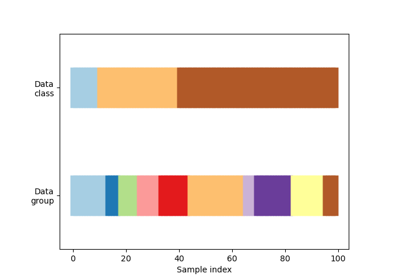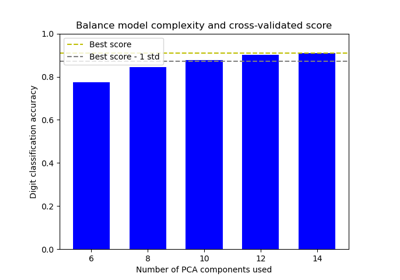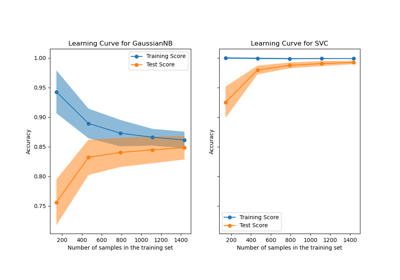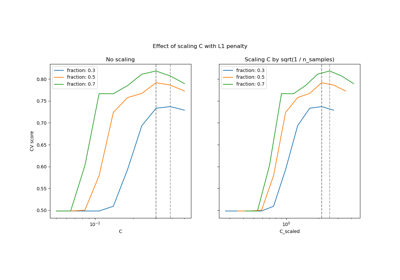ShuffleSplit#
- class sklearn.model_selection.ShuffleSplit(n_splits=10, *, test_size=None, train_size=None, random_state=None)[source]#
Random permutation cross-validator.
Yields indices to split data into training and test sets.
Note: contrary to other cross-validation strategies, random splits do not guarantee that test sets across all folds will be mutually exclusive, and might include overlapping samples. However, this is still very likely for sizeable datasets.
Read more in the User Guide.
For visualisation of cross-validation behaviour and comparison between common scikit-learn split methods refer to Visualizing cross-validation behavior in scikit-learn
- Parameters:
- n_splitsint, default=10
Number of re-shuffling & splitting iterations.
- test_sizefloat or int, default=None
If float, should be between 0.0 and 1.0 and represent the proportion of the dataset to include in the test split. If int, represents the absolute number of test samples. If None, the value is set to the complement of the train size. If
train_sizeis also None, it will be set to 0.1.- train_sizefloat or int, default=None
If float, should be between 0.0 and 1.0 and represent the proportion of the dataset to include in the train split. If int, represents the absolute number of train samples. If None, the value is automatically set to the complement of the test size.
- random_stateint, RandomState instance or None, default=None
Controls the randomness of the training and testing indices produced. Pass an int for reproducible output across multiple function calls. See Glossary.
Examples
>>> import numpy as np >>> from sklearn.model_selection import ShuffleSplit >>> X = np.array([[1, 2], [3, 4], [5, 6], [7, 8], [3, 4], [5, 6]]) >>> y = np.array([1, 2, 1, 2, 1, 2]) >>> rs = ShuffleSplit(n_splits=5, test_size=.25, random_state=0) >>> rs.get_n_splits() 5 >>> print(rs) ShuffleSplit(n_splits=5, random_state=0, test_size=0.25, train_size=None) >>> for i, (train_index, test_index) in enumerate(rs.split(X)): ... print(f"Fold {i}:") ... print(f" Train: index={train_index}") ... print(f" Test: index={test_index}") Fold 0: Train: index=[1 3 0 4] Test: index=[5 2] Fold 1: Train: index=[4 0 2 5] Test: index=[1 3] Fold 2: Train: index=[1 2 4 0] Test: index=[3 5] Fold 3: Train: index=[3 4 1 0] Test: index=[5 2] Fold 4: Train: index=[3 5 1 0] Test: index=[2 4] >>> # Specify train and test size >>> rs = ShuffleSplit(n_splits=5, train_size=0.5, test_size=.25, ... random_state=0) >>> for i, (train_index, test_index) in enumerate(rs.split(X)): ... print(f"Fold {i}:") ... print(f" Train: index={train_index}") ... print(f" Test: index={test_index}") Fold 0: Train: index=[1 3 0] Test: index=[5 2] Fold 1: Train: index=[4 0 2] Test: index=[1 3] Fold 2: Train: index=[1 2 4] Test: index=[3 5] Fold 3: Train: index=[3 4 1] Test: index=[5 2] Fold 4: Train: index=[3 5 1] Test: index=[2 4]
- get_metadata_routing()[source]#
Get metadata routing of this object.
Please check User Guide on how the routing mechanism works.
- Returns:
- routingMetadataRequest
A
MetadataRequestencapsulating routing information.
- get_n_splits(X=None, y=None, groups=None)[source]#
Returns the number of splitting iterations as set with the
n_splitsparam when instantiating the cross-validator.- Parameters:
- Xarray-like of shape (n_samples, n_features), default=None
Always ignored, exists for API compatibility.
- yarray-like of shape (n_samples,), default=None
Always ignored, exists for API compatibility.
- groupsarray-like of shape (n_samples,), default=None
Always ignored, exists for API compatibility.
- Returns:
- n_splitsint
Returns the number of splitting iterations in the cross-validator.
- split(X, y=None, groups=None)[source]#
Generate indices to split data into training and test set.
- Parameters:
- Xarray-like of shape (n_samples, n_features)
Training data, where
n_samplesis the number of samples andn_featuresis the number of features.- yarray-like of shape (n_samples,), default=None
The target variable for supervised learning problems.
- groupsarray-like of shape (n_samples,), default=None
Always ignored, exists for API compatibility.
- Yields:
- trainndarray
The training set indices for that split.
- testndarray
The testing set indices for that split.
Gallery examples#

Visualizing cross-validation behavior in scikit-learn

Balance model complexity and cross-validated score

Plotting Learning Curves and Checking Models’ Scalability
